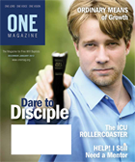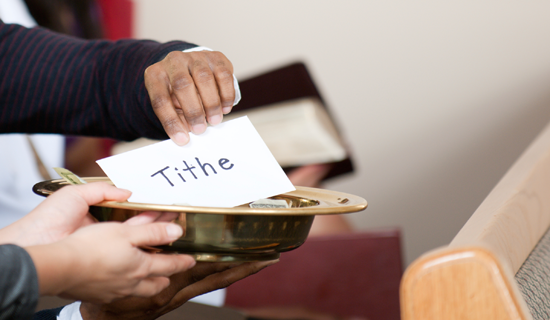
December-
January 2012
Dare to Disciple
----------------------
|

brown on green, A Regular column about finances
by David Brown
Handling the Lord's Money
Churches need to be careful in handling money given to the church. Unfortunately, this has become a problem area, even in fundamental churches where 32% report embezzlement. The actual rate is probably higher, because many cases go unreported. In light of this grim statistic, consider taking a few simple steps to reduce the chances of this happening in your own congregation.
It is very important to separate duties as much as possible. For instance, since the treasurer usually writes all the checks, ask a different person to deposit the money into the bank. Stamp every check for deposit only as soon as the offering is counted. A minimum of two people should count the money, and rotate this responsibility among several people so the same pair does not count every time. Deposit funds as soon as possible. If available, use the night depository on Sunday night.
Have the bank statement sent to someone other than the treasurer who can review the bank statement and checks written. This person should also look for unfamiliar vendors and checks made out to cash. Send contribution receipts and encourage donors to report discrepancies between their records and church records. Use contribution envelopes, especially for those who give cash. The church should insist on receiving a regular financial statement at least once a quarter.
Handling the Lord’s money is more than just avoiding embezzlement, however. It is important to manage the resources given to the church wisely. Like an individual household, every church should have a budget and monitor spending closely. A church should build up an emergency fund to take care of large or unexpected expenses such as replacing a roof or air conditioning unit. Generally, two to three months of church expenses are sufficient, but in some cases, more may be needed.
Churches also should have a policy about handling bequests. Since this is the last gift the church will receive from this person, it should be put in more permanent funds, such as a building fund or endowment to support the church. Investing the Lord’s money is very important. Investing as a fiduciary of a charitable organization is different from making your own individual investments. Those who make decisions about investing are held to a high standard.
Many churches have discovered that Money Management Trusts offered by the Free Will Baptist Foundation are a good place to park emergency and other long-term funds. We should all be careful in how we manage the Lord’s money. We will give an account one day.
The Embezzlement Problem
-
15% of all churches
-
25% of evangelical churches
-
32% of all fundamental churches
Don’t let your church become an embezzlement statistic.
About the Writer: David Brown became director of the Free Will Baptist Foundation in 2007. Send your questions to David at david@nafwb.org. To learn how the Foundation can help you become a more effective giver, call 877-336-7575.
|
|

